What follows is an edited diary sent to me by a friend, Chris Lincoln Jones, who has spent the last eight months in Helmand Province, Afghanistan. He would have posted this himself, except for communication problems. Hopefully his account will help to inform and inspire debate about Obama’s strategy in Afghanistan.
The good intentions of writing lots of pieces about life here never really survived contact with the enemy; the enemy being a daily diet of office work involving constant writing. Yesterday was rather different, as I have taken on the rather grandiose title of Brigade Patrol Master.
I am looking across Helmand and trying to identify the patterns we set that are subsequently exploited by our enemy when he lays his mines and I try to devise ways to counter his wickedness.

So yesterday I went out on patrol with J Company…
A picture paints etc so here’s a Snatch Landrover.
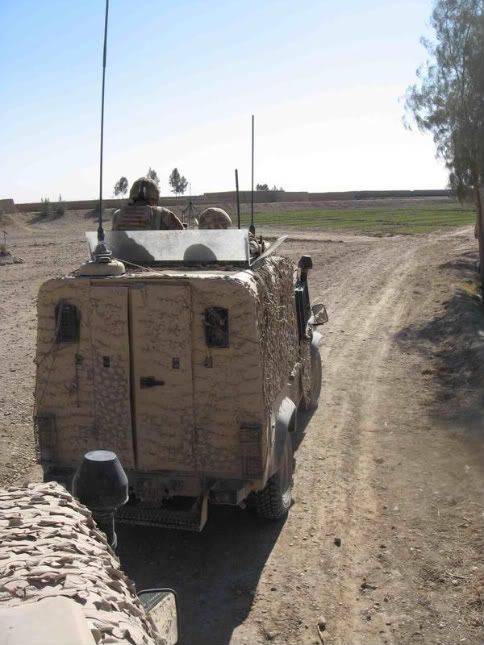
It’s basically a normal landrover with just sufficient armour to make it top heavy and sink into the terrain but not sufficient to protect the contents from rockets and bombs. It’s not the protection that we worry about though it’s the lack of mobility.
Our patrol is to take us north from Lashkar Gah along the east bank of the Helmand River. We are going to push past the northernmost police post, check a place where a bomb or what we would call an IED (Improvised Explosive Device) has been reported, and then penetrate into seldom visited country to see if “Terry” is about.
We leave Lash at a clip. Lots of waving from the children of the time and quite friendly reaction from the adult locals. The air is cold but it’s very sunny, a beautiful day. Bracing but just so. As we leave the town any trace of modernity ends and we are amongst high mud-walled compounds that would be recognised by troops from as far back as Alexander’s campaigns.
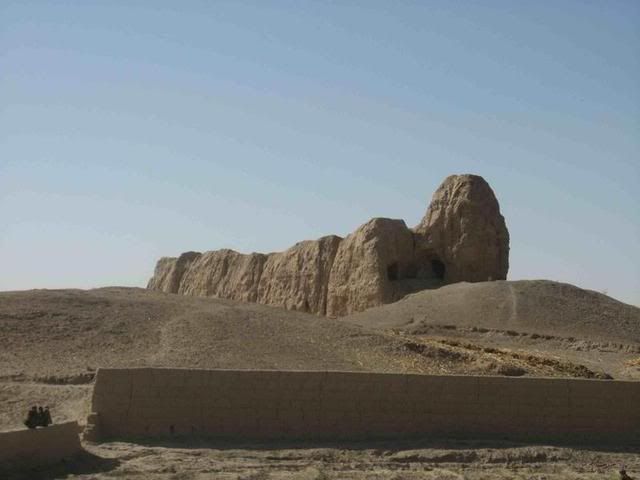
We pass an ancient fort viewed in the photograph across the top of a compound wall. This is a barren land that is painfully cultivated. Water is pumped from the river into irrigation ditches and out into the desert. You can see the little raised edges of the cultivated patches that hold water in. We are still some way short of the police post and part of the routine is to stop a few times and take a bit of a walk about to talk to the locals.
The locals are friendly and communicative this close to Lash. They are keen to present a list of things we can do for them. This lot were keen for a mosque, I think they wanted it to go with the well they got last time. Behind the WIMIK and across the river is the country we have been fighting over.
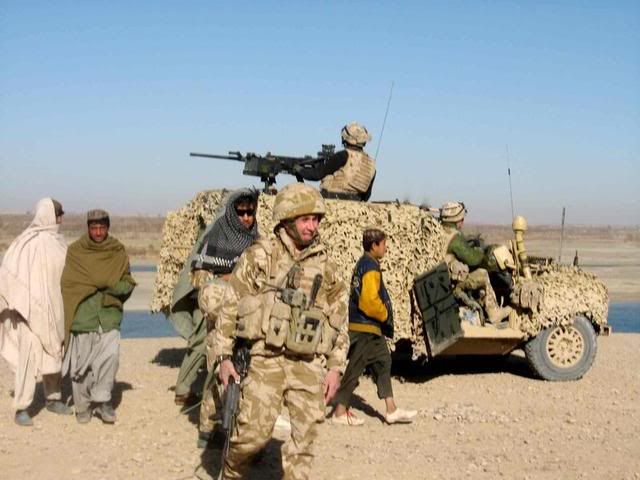
There are loads of children who are of course after stuff, pencils and pens mostly. If the parents have any impetus there are schools that they can get to. The signaller told me that they’d given two kids Yorkie Bars out of a ration pack and the bigger one belted the smaller and took both. The signaller was quite offended by this behaviour.
It may be a Royal Marine thing of course – they look at the incredible hardship and afford it respect. After all they all have to go through the Green Beret Course! I chatted quite a bit about the history, customs religion and they already knew most of it anyway having taken the trouble to learn what was on offer in the training before we came out. They all regarded it as professional to know about the religion and culture and understand it.
The compounds further north within reach of the river are more dispersed, with larger patches of farmland featuring.
Now there is open desert as well, hard packed and stony so we disperse and get off the tracks that channel us. I note how carefully our driver follows the tyre marks of the leading vehicle of our group; taking great trouble not to deviate… Following tyre marks is survival, you know that there isn’t a mine or pressure pad if your opo has just driven there.
After a few kilometres another peculiar Afghan sight is laid before us, we’ve come to the last police post on the east bank and it lies on a promontory that looks north and west. You can tell it’s tactically sound because and old soviet fort is there and trenches dotted around from the same era.
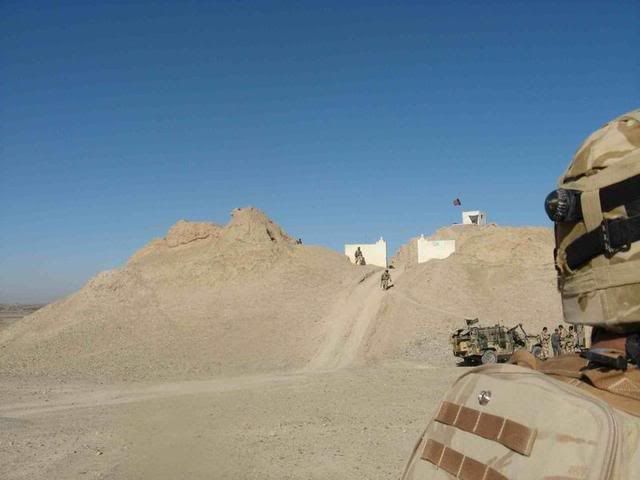
The Afghan National Police, ANP in our shorthand, have built their post on top and you can see the incongruous painted walls in the picture. The guys you can see ascending the slope are Ghurkhas from the Police Mentoring Team who were visiting to check on the police. We are trying hard to improve the police who have the most horrific reputation. They are at best widely distrusted, at worst hated by the locals.
Poorly paid, the ANP “tax” the general population in the course of their patrolling. On a couple of occasions we’ve even caught them raping young boys that they’ve kidnapped. Fortunately cooler heads amongst our people have prevented the dispensation of summary justice.
Improving them is an uphill struggle but it is being achieved. Our civil affairs group has increasing primacy in our efforts and our main effort is good governance because if we can’t get the people to trust their own leaders or security forces we’re never going to get away from here.
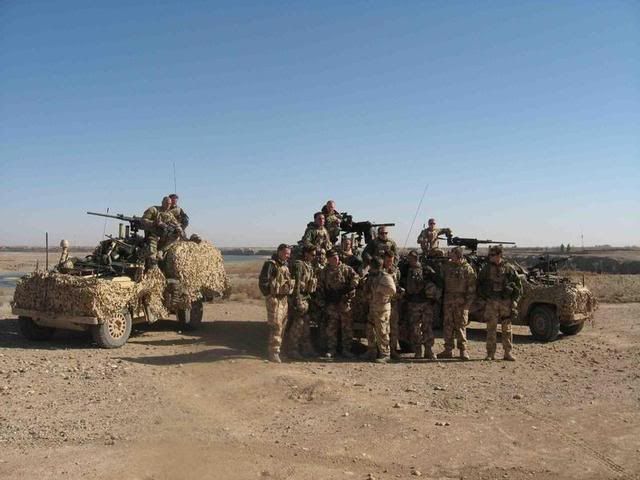
We stopped for a group photo here. You can see our firepower in this one; we kept the snatches out of shot because they don’t look cool. The WIMIKs have .5inch machine guns in the back and the lighter General purpose Machine Gun for the passenger. The middle vehicle in the shot has a 30mm grenade machine gun. Ours is quite a strong patrol by the prevailing standards with good flinch factor to discourage Terry from having a go at us.
After this little pause we put on our war faces and set off right of shot into the less well-known country. We’ve been told that an IED has been discovered here and sure enough we bounce along the tracks to the reported position and stop a moped with a couple of scruffy police on board who tell us that the place is marked with red paint. The danger is in an obvious place at an irrigation ditch with only a couple of places to cross.
We stop and manoeuvre into loose formation with weapons pointing outwards and consider our options. The lighthearted atmosphere has disappeared. Everyone searches the surroundings intently, we call it checking our 5s and 20s, referring to the number of metres meticulously checked (5) and carefully checked (20).
Through the sight of my rifle I can see 15 or so Afghans who, until we turned up, were working on the irrigation channel. Now they squat on the berm 70 or 80 metres away watching us, they look like crows and I have in my mind an image from Hitchcock’s The Birds. One of the lads wryly remarks that we’re on Taliban TV.
We are going to use the second crossing point and it is eyed suspiciously, actually everywhere is being eyed suspiciously. Disturbed earth, incongruous piles of stones, all are now potentially dangerous. The patrol goes into a drill and we have some technical kit that the layman would describe as a mine detector.
We creep forward to the narrow gap.
In my ear the chat is terse and sparse; the lone figure in front then freezes and says he has a “reading”, very carefully the ground is explored. An area is marke
d and Sgt M decides we can get around it. “It” may be nothing, a spurious bit of metal, who knows? Very carefully and one vehicle at a time we crawl past the marker in the track. Looking down from the top of my snatch I feel mixed emotions and 50 metres further on realise that I didn’t take a photograph – sorry about that.
We’re a few kays on from the crossing point and deep in contested territory now. The population have a different attitude out here. They are not hostile, just indifferent and cold. They’d rather we weren’t there and they’d rather the “Mooj” weren’t either. In any case talking to us can be bad for the health so they answer the questions politely enough:
“No, they haven’t seen the Taliban”
“We grow wheat and some poppy”
“No we don’t want anything”.
This is the first time I’ve seen the poppy being cultivated. The plants are small at the moment and being pricked out. It’s a brilliant crop, tolerates drought and cold, grows quickly in poor soil without much attention; worth 10 times more than wheat. The only thing you can’t do is eat it.
Our target village on the banks of the river lies before us and it’s fairly deserted, the men from the story above scratching about in the field nearby. The going is tough and it’s difficult to get through or around some of the obstacles, it’s time to push inland so we have final admire of the view over the river. This time we are looking into enemy territory and as you read this the Afghan Army are fighting in it to do their bit of the SOND CHARA operation.
As we mount up to push west there is a faint feeling of disappointment amongst the boys as they were keen to get into a scrap so that I could “get some rounds down”, they felt that they’d let me down. Rather touching I thought.
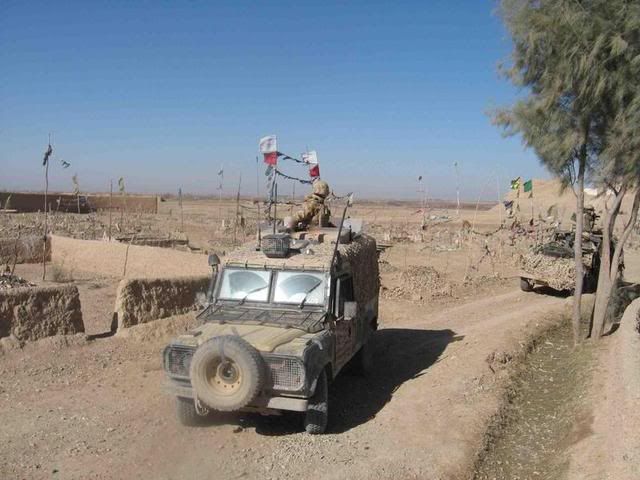
Throughout the patrol we passed a lot of cemeteries that all look pretty much like the one in the picture. The graves have no obvious markers other than the flags. What struck me, and the reason for this vignette is the number of children’s graves. I estimated that in all the plots we passed about a third of the graves, maybe more, were small. We are told that the infant mortality rate is high and our training reels off percentages and average ages of Afghans but this graveyard was the starkest of illustrations. The kids are terrible bullet magnets as well, a distressing number get hit by crossfire or by stray rounds. Barely a week goes by without a broken child being brought into one of our patrol bases.
We do what we can and we are sometimes the cause, mostly we evacuate them to a hospital run by a charity in Lashkar Gah, Italian I think, miracle workers I know. They are careful not to be aligned with us and we know but ignore that the TB are treated there. I think our chief medic smuggles supplies when he goes to visit them!
As we pulled away east across the country one of the WIMIKS breaks down. The poor vehicles are overused and battered to hell so it’s no surprise. Our mechanics are brilliant and the force must be strong in them because they manage to keep the fleet pretty much on the road. The knackered wagon is hitched to a Snatch and we carry on.
The dynamic has changed again because now a third of our firepower is potentially unable to manoeuvre; we are also know unable to get off the tracks. A short debate over the radio and it’s decided to cut straight to the “hard-top” and return to base.
Our last bit of excitement crops up as we see in the distance a couple of camel trains. At first the patrol is inclined to little more than comment, until I mention that they are still used to smuggle stuff. The herders are on their way to Lash to sell the beasts and they have walked about 15 miles from Gereshk in the north. The animals are carrying forage for the journey so our dreams of a drugs bust are shattered.
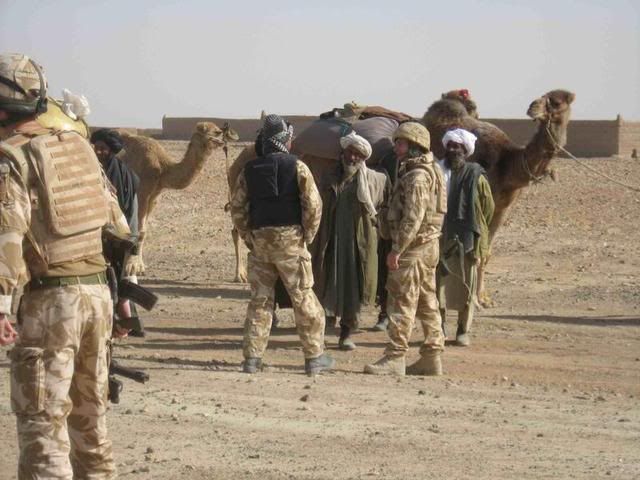
The nomads were friendly and chatted quite happily to us, The guy with the blue armour is our interpreter and he’s with the Intelligence Warrant Officer who is doing the questioning.
The bit of banter with some locals and the amusement of a close encounter with camels dispelled the last of the grim in the patrol and once on the black top the banter is back on the air. The trip back into the town is pretty quick and the contrast between the countryside and the town even more marked than when we left as this time we enter through the commercial part of town.
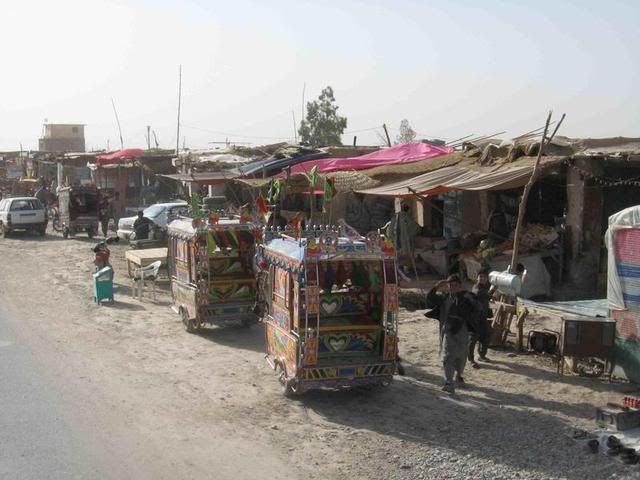
That’s not to say it’s Oxford Street as you can see. In spite of the pretty serious cull that Allah lays down on them the streets teem with kids and there’s lots of shouts, smiles and scrounging. Traffic pulls over for us as we rattle along and if it doesn’t we fire mini-flares to draw attention to ourselves.
This is one of our escalation of force measures as we must use non-lethal measures if at all possible unless we are being fired at or can positively identify a weapon. You might wonder why we do this in town: it’s because the threat changes once we’re in the city limits; now we must worry about suicide bombers so we don’t much like being approached by cars. We recently had two marines killed by a child of 13 pushing a wheelbarrow packed with explosives.
The main road in the picture is the only tarmac, when we turn towards camp it’s back to the dirt track. A mediaeval society with mobile phones as someone described it.
When we get back it’s a relief to pull off armour and helmet and sit down with a wet. We go over the patrol in meticulous detail. This will result in a written report the next day, which is used to inform the intelligence group and plan future operations. My hope is I can procure kit that together with drills and procedures can reduce our encounters with IEDs and mines.
If ever I feel short of impetus I just need to look to the wall on my left as I leave the HQ; 23 faces stare back. 2 more went up today.
Thu 15 Jan 2009
Note from Brit: on the day this written two more British soldiers were killed in Afghanistan.
15 comments